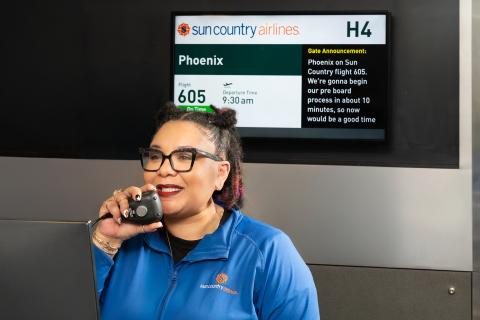MSP Airport debuts enhanced accessibility programs for travelers who are deaf, hard of hearing
MSP Airport debuts enhanced accessibility programs for travelers who are deaf, hard of hearing
MSP Airport is expanding its internationally accredited accessibility program with two novel initiatives aimed at helping travelers and airport visitors who are deaf or hard of hearing.
Aira ASL
Aira is launching its first Aira ASL pilot offering travelers who are deaf or hard of hearing secure, on-demand access to professional ASL interpreters. Interpreters will partner with callers through their mobile phones to enhance the ease and efficiency of travel across all kinds of situations — including checking in, changing flights, making retail transactions, or finding ground transportation options. There is no charge to users who access the program while traveling through MSP.
Aira has had a presence at MSP since 2018, offering on-demand professional visual interpreting for individuals who are blind or who have low vision. Aira services are accessed with the Aira app available through Apple App Store or Google Play Store.

Talk-to-text
MSP has also implemented its own talk-to-text platform to improve travel communications for passengers who are deaf or hard of hearing. Live airline gate announcements are now displayed in real time on gate monitors in Terminal 2. MSP is also using the system in its “common use” gates in Terminal 1 and plans to expand the service to additional gates and airlines in the near future.
The idea of real-time captioning for gate announcements was brought forward to MSP’s Travelers with Disabilities Committee (TDAC) by its chair, Andrew Palmberg, who is deaf and also serves as the representative for the Minnesota Commission of the Deaf, DeafBlind & Hard of Hearing.
“I've personally missed gate changes and other announcements at the gate in the past and had this same experience happen to other deaf and hard-of-hearing friends, causing them to miss their flight and be rebooked on a later flight, creating more stress and frustration,” Palmberg said. “As a traveler with a disability, I am always hyper-focused on happenings around my surroundings to ensure I am not missing any information about my flight. The talk-to-text technology reduces my stress, frustration and reliance on gate agents to inform me what is occurring around me and the flight.”
Palmberg said the accessible technology can also benefit travelers who may better comprehend written text, or other travelers who need clarity when there can be overlapping announcements in a noisy environment.